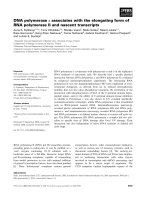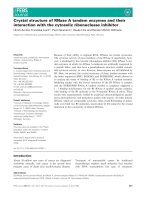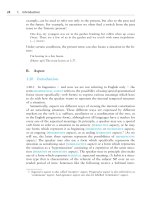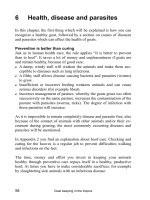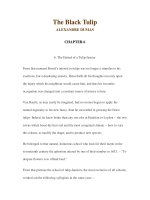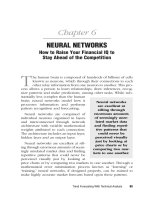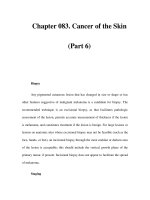Some struture with the ing form 6 potx
Bạn đang xem bản rút gọn của tài liệu. Xem và tải ngay bản đầy đủ của tài liệu tại đây (202.49 KB, 6 trang )
91 This, that, these and those
We use this and these for things near the speaker
(this printout here). This goes with a singular or
uncountable noun, e.g. this report. These goes with
a plural noun, e.g. these results.
We can leave out the noun if the meaning is clear. I'm
just having a look at this. That's nice, isn't it?
Last month's figures were bad, but these are worse.
We use that and those for things further away
(that table there). That goes with a singular or
uncountable noun, e.g. that furniture. Those goes
with a plural noun, e.g. those curtains.
B Places and people
When we are in a place or a situation, we use this (not that) to refer to it.
There's a wonderful view from this office, just come to the window. This
party isn't much fun, is it? Shall we go home?
We can use this to introduce people and that to identify people.
Jake, this is my friend Rita. That's Andrew over there. On the phone we can use this to say who
we are and this or that to ask who the other person is.
Hello? This is Laura speaking. Who's this/that, please?
C Time
This/these can mean 'near in time' and that/those 'further away in time'. I'm
working as a tourist guide this summer. I'm pretty busy these days. Do you
remember that summer we all went to Spain? Those were the days. 1 can't
see you on the third of July. I'm on holiday that week.
To refer back to something that has just happened or was just mentioned, we normally use that.
What was that noise? ~ I didn't hear anything. Jessica is on a diet. That's why she doesn't want to
eat out with us. I've lost my key. ~ Well, that's a silly thing to do.
To refer forward to something that is just going to happen or something that we are going to say, we uset
This next programme should be quite interesting. I don't like to say this, but I'm not happy with the
service here.
13 D this week, this year, etc
91 Exercises
1 This, that, these and those (A)
Write each of the words (this, that, these, those) in the correct place.
Near
Further away
Singular this
Plural
2 This, that, these and those (A)
Complete the sentences. Use this, that, these and those, and these nouns:
car, dog, flowers, parcel, trees
► That car has crashed.
1 Would you like ….……………………
2 I must post ……………………………
3 The house is behind………………
4 Whose is ………………
This, that, these and those (A-C)
Complete the conversations. Use this, that, these and those.
► Mark: Are we going out this evening?
Sarah: I can't really. I'll be working late at the office.
1 David: I hear you've got a new flat.
Rita: 's right. I've just moved in.
2 Mike: What's the matter?
Harriet: It's boots. They don't fit properly. They're hurting my feet.
3 Jessica: It's so boring here.
Rachel: I know. Nothing ever happens in place.
4 Emma: What's happened? You look terrible.
Vicky: You won't believe , but I've just seen a ghost.
5 Laura: What kind of planes are ?
Trevor: I don't know. They're too far away to see properly.
6 Matthew: The match is three weeks from today.
Daniel: Sorry, I won't be able to play for the team. I'll be away all.…………… week.
7 Mark: Zedco. Can I help you?
Alan: Hello is Alan. Can I speak to Fiona, please?
8 Daniel: I've had bump on my head ever since someone threw a chair at me.
Natasha: Someone threw a chair at you? wasn't a very nice thing to do.
9 Mark: seats aren't very comfortable, are they?
Sarah: No, I don't think I'll want to sit here very long.
92 My, your, etc and mine, yours, etc
A Introduction
Mark: Why have you brought your work home? We're going out.
Sarah: /'// do it later. Let's go now. Shall we take my car?
Mark: Well, I'd rather not take mine. I think there's something wrong with it.
My, mine, your, etc express possession and similar meanings. My car means the car belonging to me; your
work means the work you are doing. My comes before a noun, e.g. my car. We use mine on its own.
MY, YOUR, ETC MINE, YOURS, ETC
First person singular: It's my car. It's mine.
Second person singular: Here's your coat. Here's yours.
Third person singular: That's his room. That's his.
It's her money. It's hers.
The dog's got its food.
First person plural: That's our table. That's ours.
Second person plural: Are these your tickets? Are these yours?
Third person plural: It's their camera. It's theirs.
B Its and it's
We use its before a noun to express the idea of belonging.
The street is around here somewhere, but I've forgotten its name.
It's is a short form of it is or it has.
I think it's time to go. (= it is) It's got a lot colder today, hasn't it? (= it has)
C My, your with parts of the body and clothes
We normally use my, your, etc with parts of the body and with someone's clothes.
Emma shook her head sadly, NOT Emma-shook-the-head sadly.
Someone came up behind me and grabbed my arm.
You must take off your shoes before you enter a mosque. But we usually use
the in the following structure with a prepositional phrase.
VERB PERSON PREPOSITIONAL PHRASE
Someone grabbed me by the arm.
The stone hit Mike on the head.
D Own
We use own after my, your, etc to say that something belongs to us and to no one else.
Rachel has got her own calculator. She doesn't borrow mine, NOT an-own calkulator I
don't share any more. I've got a flat of my own. NOT of mine own
E A friend of mine
Look at these examples.
Tom is a friend of mine. (= one of my friends) NOT a friend of me
Rachel came to the party with a cousin of hers. (= one of her cousins)
I borrowed some magazines of yours. (= some of your magazines)
Note also 's in this example: Rita is a friend of Melanie's.
92 Exercises
1 My, your, etc and mine, yours, etc (A)
Complete the conversation. Put in the missing words.
Laura: Did you and (►) your friends have a nice holiday?
Emma: Yes, it was wonderful. We had the best holiday of (1)…………… lives.
It didn't start very well, though. Daniel forgot to bring (2)…………. passport.
Laura: Oh, dear. So what happened?
Emma: Well, luckily he doesn't live far from the airport. He rang (3)…………… parents,
and they brought the passport over in (4)……………car, just in time.
Laura: You remembered (5)…………… , I hope.
Emma: Yes, I had (6)………… , even though I'm usually the one who forgets things.
Actually Rachel thought for a minute that she'd lost (7)
Luckily it was in (8)………… suitcase. Anyway, in the end we had a marvellous time.
2 Its and it's (B)
Put in the correct form.
? Unfortunately, the town has lost its only cinema.
? The meeting won't last long. I'll see you when it's over.
1 You should return the book to……………owner immediately.
2 We'd like to go out for a walk, but…………… raining.
3 I'm not buying this tablecloth because………… got a hole in it.
4 The board has decided that Zedco needs to improve………… image.
3 Parts of the body and clothes (C)
Put in my, your, etc or the.
? I was doing keep-fit exercises when I fell down and hurt my leg.
? Matthew served, and the ball hit Daniel on the knee.
1 A wasp stung me on………… neck. It really hurt.
2 The mother put both …… arms around the child.
3 Aunt Joan kissed Emma on………… . cheek.
4 The fans were all shouting at the top of.…………. voices.
5 Don't just stand there with ………… hands in…………. pockets.
My own, a friend of mine, etc (D-E)
Correct the sentences which have a mistake.
► We're lucky. We've got an-own-garden.
We've got our own garden.
1 I met some nice people. Harriet introduced me to -a fricnd-of-hefsetf.
2 My friends swim every day. They've got their only pool.
3 I enjoy rock-climbing, It's a favourite hobby-to me.
4 I hope Matthew will be here, I've got some-GDs-from his.
5 I don't want to share. I'd like-my very room
93 The possessive form and of
A Form
We use the possessive of a noun in phrases like the boy's name and Vicky's room.
We form the possessive like this.
Singular noun: 's boy -> boy's Vicky -> Vicky's
Plural noun ending in s: ' boys —> boys' tourists ~> tourists'
Plural noun not ending in s: 's men —> men's children —> children's
We can use the possessive form with another noun or on its own.
I've met Rachel's family, but I haven't met Vicky's. (Vicky's - Vicky's family)
B The boy's name or the name of the boy?
Compare these structures.
THE POSSESSIVE FORM PHRASE WITH OF
the boy's name the name of the boy
the boys' names the names of the boys
the men's names the names of the men
Sometimes we can use either the possessive (the boy's name) or a phrase with of (the name of the boy), but
often only one is possible. We normally use the possessive with people and animals.
my friend's house Claire's idea Daniel's brother our neighbour's garden the dog's owner
the policemen's uniforms the women's changing room the Parkers' car
We normally use of with things, and not the possessive form. the
side of the house NOT the house's side the result of the match
NOT the match's result the day of the meeting NOT the
meeting's day
But we use of with people when there is a long phrase.
the house of one of our teachers at college the
address of those people we met in Spain
NOT those people who we met in Spain's address
We can use both structures for places and organizations. London's
museums OR the museums of London the earth's atmosphere OR the
atmosphere of the earth the company's future OR the future of the
company the government's intentions OR the intentions of the
government
C The possessive of time
We can use the possessive to say 'when' or 'how long'.
last week's concert today's TV programmes yesterday's news
about a month's work a moment's silence ten minutes'walk
Note also:
in two months' time (two months from now) a
week's wages (wages for a week)
► the children's dog 3
1……………………………………… 4
2……………………………………… 5 ………………………………………………….
2 The possessive form (A)
Laura is showing Melanie her photos. Put in the possessive form of the nouns.
Laura: This was taken in (►) my friend's (my friend) garden.
It was (1) …………… (the twins) birthday party.
This is Kerry, (2) ………………… (Luke) girlfriend.
And that's (3) …………… (Jason) sister Emily.
Melanie: And who are these two?
Laura: That's (4) (Debbie) mother.
She's talking to Monica Davis, (5) ……………………….(her children) teacher.
And that's (6) (the Lanskys) dog
sitting on (7) (Olivia) foot.
3 The boy's name or the name of the boy? (B)
Ed Buckman writes detective stories. Here are the titles of some of his stories.
Write the titles using either of or a possessive form (with s or s').
? the mistake / the policeman The Policeman's Mistake
? the bottom / the bottle The Bottom of the Bottle
1 the gun / Mr Hillman
2 the smell / blood
3 the car / the terrorist
4 the middle / the night
5 the death / someone important
6 the money / the gangsters
4 The possessive of time (C)
Rewrite the underlined phrases using a possessive form.
? The prices this year are even lower. This year's prices
? From here it's a drive of two hours. a two hours' drive
1 I read about it in the paper yesterday
2 I just want a rest for five minutes.
3 It's the special offer for this month.
4 I'll see you in a week.
93 Exercises
The possessive form (A)
Write descriptions of the things in the photos. Use boy, girl and children and these words:
bike, cat, dog, skateboards, tent, trophies

